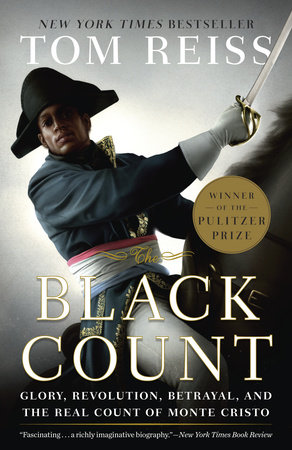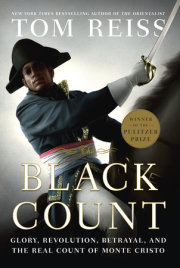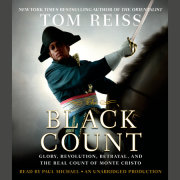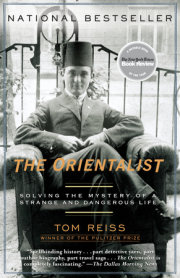1
the sugar factory
Alexandre Antoine Davy de la Pailleterie—father of the future Alex Dumas—was born on February 26, 1714, in the Norman province of Caux, a region of rolling dairy farms that hung above great chalk cliffs on the northwest coast of France. A scrawled scrap of paper from the time states that he was baptized “without ceremony, at home, because of the peril of death,” suggesting he was too sickly to risk bringing in to the local church. He was the firstborn son of an old family that possessed a castle, a scarcity of cash, and an abundance of conniving members, though Antoine would one day outdo them all.
The boy survived, but the following year his sovereign, King Louis XIV, the Sun King, died after seventy-two years on the throne. As he lay dying, the old king counseled his heir, his five-year-old great-grandson: “I loved war too much, do not imitate me in this, nor in my excessive spending habits.” The five-year-old presumably nodded earnestly. His reign, as Louis XV, would be marked by a cycle of spending and wars so extravagantly wasteful and unproductive that they would bring shame not only on his person but on the institution of the French monarchy itself.
But the profligate, war-driven habits of its kings could not hold France back. In fact the “Great Nation” was about to unleash the age of the philosophes, the Enlightenment, and all that would follow from it. Frenchmen were about to shake the world into the modern age. Before they could do that, they would need money. Big money.
Big money was not to be found in Normandy, and certainly not around the Pailleterie château. The family’s coat of arms—three golden eagles holding a golden ring on an azure background—looked impressive but meant little. The Davy de la Pailleteries were provincial aristocrats from a region more abounding in old glories than in current accounts. Their fortune was not enough to sustain grandeur without work—or not for more than one generation.
Still, a title was a title, and as the oldest son, Antoine would eventually claim the title of “marquis” and the ancestral estate of Bielleville that went with it. Next in succession after Antoine were his two younger brothers—Charles Anne Edouard (Charles), born in 1716, and Louis François Thérèse (Louis), born in 1718.
Faced with their limited prospects in Normandy, all three Pailleterie brothers sought their fortunes in the army, which then accepted nobles as young as twelve into its commissioned ranks. Antoine received a commission in the Corps Royal de l’Artillerie, an up-and-coming branch of the service, as a second lieutenant at sixteen. His brothers soon followed him as teenage junior officers. The Pailleterie brothers were kept busy by His Majesty’s plunge, in 1734, into the War of the Polish Succession, one of a series of dynastic conflicts that regularly provided excuses for the gory quaintness of eighteenth-century European combat. The big-power rivals behind this little war were the traditional competitors for European land domination, the Bourbons and the Hapsburgs, France and Austria. (England would soon play a bigger role, especially on the high seas and in the New World, but that was still one or two wars in the future.)
In addition to his commission in the artillery, Antoine served at the front as gentleman in the entourage of the Prince de Conti, the king’s dashing, fabulously rich cousin. Antoine saw his main action at the Siege of Philipsburg, in 1734—later written into the military annals by Karl von Clausewitz, in On War, as the “perfect example of how not to site a fortress. Its location was that of an idiot standing with his nose against the wall.” Voltaire was also there, fleeing a royal arrest warrant, and working as a kind of one-man eighteenth-century USO show during the siege, offering bons mots and brandy between bouts of battle and composing odes to the military men.
The most notable event in Antoine’s service at Philipsburg, however, was that he served as a witness to a duel that took place on the night of the Prince de Conti’s birthday party at the front: it was between the Prince de Lixen and the Duke de Richelieu. The duke took offense when the prince mocked the Richelieu pedigree. The duke’s grandfather had been Cardinal Richelieu (later immortalized as the mustache-twirling nemesis of the Three Musketeers), an adviser to Louis XIII who had managed royal financial and building projects to great advantage—both for himself and for France. But such accomplishments did not measure up to the high standards of snobbery practiced by Lixen, who regarded the Richelieu clan as parvenus. To make matters worse, the duke had recently offended the prince by marrying one of his cousins.
At midnight, the illustrious in-laws met in the field of honor between the dining tents and the trenches. They began lunging at one another there in the dark, their lackeys lighting the swordfight with flickering lanterns. The prince took the advantage first, wounding Richelieu in the thigh. The lackeys switched from lanterns to bare torches, and the combatants chased each other in and out of the trenches, their blades reflecting fire. The prince stabbed the duke in the shoulder. At this point an enemy barrage lit the field of honor. One of the lackeys was hit and killed.
Richelieu counterattacked, and with Antoine watching, the duke sank his blade into the chest of his unfortunate in-law. Contemporaries considered it a sort of poetic justice, since Lixen himself had recently dispatched one of his own relations, his wife’s uncle, the Marquis de Ligneville, for a similarly trifling offense. Such were the friendly-fire deaths of the eighteenth-century battlefield.
In 1738, when the war ended, Antoine took the chance to get out of the army and Europe altogether. While he was stationed at Philipsburg, his younger brother Charles had joined a colonial regiment that went to the French sugar colony of Saint-Domingue, on the West Indian island of Hispaniola. This was a fortunate posting.
Sugar planting was the oil business of the eighteenth century, and Saint-Domingue was the Ancien Régime’s Wild West frontier, where sons of impoverished noble families could strike it rich. Barely sixteen when he arrived in the colony as a soldier, by twenty-two Charles Davy de la Pailleterie had met and wooed a young woman, Marie-Anne Tuffé, whose family owned a sizable sugar plantation on the colony’s wealthy northeast coast. Antoine decided to join him.
Today, the world is so awash in sugar—it is such a staple of the modern diet, associated with all that is cheap and unhealthy—that it’s hard to believe things were once exactly the opposite. The West Indies were colonized in a world where sugar was seen as a scarce, luxurious, and profoundly health-giving substance.
Eighteenth-century doctors prescribed sugar pills for nearly everything: heart problems, headache, consumption, labor pains, insanity, old age, and blindness. Hence, the French expression “like an apothecary without sugar” meant someone in an utterly hopeless situation. Saint-Domingue was the world’s biggest pharmaceutical factory, producing the Enlightenment wonder drug.
Columbus brought sugarcane to Hispaniola, the first European settlement in the New World, on his second voyage, in 1493. The Spanish and the Portuguese had been the first to cultivate sugar in Europe, and when they began their age of discovery, among the first places they “discovered” were islands off the coast of North Africa just perfect for sugar cultivation. As the Iberian explorers made their way down the African coast—the Portuguese going around the Horn to East Asia, the Spaniards cutting west to the Americas—both powers had two main goals in mind: finding precious metals and planting sugarcane. (Oh, and spreading the word of God.)
The Spanish established a colony on the eastern side of Hispaniola and named it Santo Domingo; eventually, the colony would extend over the eastern two-thirds of the island, roughly corresponding to the modern-day Dominican Republic. (The native inhabitants called the entire island by another name: Hayti.) The Spanish brought artisans from the Canary Islands, off the coast of West Africa, to build the elaborate on-site technology needed for sugar production—presses, boilers, mills—and then brought the most essential ingredient of all: African slaves.
Slavery, of course, had existed since antiquity. The Greek city-states had created democracy among a small elite by enslaving almost everybody else, in some cases up to a third of the population. Aristotle believed democracy could exist only because of slavery, which gave citizens the leisure for higher pursuits. (Modern versions of this argument held that American democracy was born of the slave society of rural Virginia, because slavery gave men like Washington and Jefferson the free time to better themselves and to participate in representative government.) In Greece and Rome, slavery was the fate of prisoners of war and barbarians, anyone not lucky enough to have been born Greek or Roman. When ancient slaves managed to buy their freedom or that of their children, they would assimilate into the free population, with no permanent mark on their descendants. Though ubiquitous in the ancient world, slavery was not based on any sense of “race.”
There was an ethnic connotation in the etymology of the word “slave,” which first appeared in the eighth century AD: the word was a corruption of “Slav,” since at the time nearly all slaves imported into Europe were ethnic Slavs. The Slavs were late converts to Christianity, and their pagan status made them vulnerable. “Slav markets” were established across Europe, from Dublin to Marseilles, where the people being bought and sold were as fair-skinned as those buying and selling them.
The rise of Islam led to a vast expansion of slavery, as conquering Arab armies pulled any and every group of “unbelievers” into bondage. Arab slave traders captured whites from the north via sea raids on European shipping, and blacks from the south via land raids or barter with the sub-Saharan kingdoms. Justified by religious faith, the Muslim slave trade was a huge trans-national business. Over time it focused more and more on black Africans. Yet there was still no fixed biological marker for bondage.
The European sugar trade changed this forever. As thousands of blacks were bought and sold out of Africa to harvest sugar, for the first time in history a biologically marked group of human beings came to be considered destined for slavery, created by the white landowners’ God for a life of permanent chattel servitude.
The Portuguese had first taken blacks to Madeira to cut sugarcane because the island was off the coast of North Africa and the Muslim traders there happened to deal in African slaves. When they sailed down the Guinea Coast, the Portuguese found the black African kingdoms were willing to supply them with slaves directly: the Africans did not consider they were selling their racial brothers to the whites. They did not think in racial terms at all but only of different tribes and kingdoms. Before, they had sold their captives to other black Africans or to Arabs. Now they sold them to whites. (The African kingdoms and empires themselves kept millions of slaves.) As time went on, Africans would learn of the horrors awaiting black slaves in the American colonies, not to mention on the passage over, yet they continued to export ever greater quantities of bois d’ébène—“ebony wood,” as the French called their cargo. There was no mercy or morality involved. It was strictly business.
Spain laid the foundations of this great wealth and evil in the Americas, then quickly became distracted and forgot about it. After introducing the plants, the technology, and the slaves into Santo Domingo, the Spanish dropped the sugar business in favor of hunting for gold and silver. They moved on to Mexico and South America in search of the precious metals, leaving the island to languish for nearly two centuries, until the French began to harness its true potential.
By the mid-to-late eighteenth century, the Saint-Domingue colony, situated on the western end of Hispaniola, where Haiti is today, accounted for two-thirds of France’s overseas trade. It was the world’s largest sugar exporter and produced more of the valuable white powder than all the British West Indian colonies combined. Thousands of ships sailed in and out of Port-au-Prince and Cap Français, bound for Nantes, Bordeaux, and New York. When the British, after winning the Seven Years’ War, chose to keep the great swath of France’s North American colonies and instead return its two small sugar islands, Guadeloupe and Martinique, they unwittingly did their archrival a favor.
Saint-Domingue was the most valuable colony in the world. And its staggering wealth was supported by staggering brutality. The “pearl of the West Indies” was a vast infernal factory where slaves regularly worked from sunup to past sundown in conditions rivaling the concentration camps and gulags of the twentieth century. One-third of all French slaves died after only a few years on the plantation. Violence and terror maintained order. The punishment for working too slowly or stealing a piece of sugar or sip of rum, not to mention for trying to escape, was limited only by the overseer’s imagination. Gothic sadism became commonplace in the atmosphere of tropical mechanization: overseers interrupted whippings to pour burning wax—or boiling sugar or hot ashes and salt—onto the arms and shoulders and heads of recalcitrant workers. The cheapness of slave life brushed against the exorbitant value of the crop they produced. Even as the armies of slaves were underfed and dying from hunger, some were forced to wear bizarre tin-plate masks, in hundred-degree heat, to keep them from gaining the slightest nourishment from chewing the cane.
The sugar planter counted on an average of ten to fifteen years’ work from a slave before he was driven to death, to be replaced by another fresh off the boat. Along with malnutrition, bugs and diseases could also eventually do in someone working up to eighteen hours a day. The brutality of the American Cotton Kingdom a century later could not compare to that of Saint-Domingue in the 1700s. There would be no shortage of cruel overseers in the United States, but North American slavery was not based on a business model of systematically working slaves to death in order to replace them with newly bought captives. The French sugar plantations were a charnel house.
Because Versailles loved laws and orders, France was the first country to codify colonial slavery. In doing so, King Louis XIV passed a law, in 1685, that changed the history of both slavery and race relations.
Le Code Noir—the Black Code. Its very name left no doubt about who were to be the slaves. It elaborated, point by point, the many ways in which black Africans could be exploited by their white masters. The Code sanctioned the harshest punishments—the penalty for theft or attempted escape was death—and stated that slaves could not marry without their master’s consent or pass on property to their kin.
But the very existence of a written legal code—a novelty of the French colonial empire—opened the way for unexpected developments. If there were laws governing slavery, then slave owners, at least in some instances, could be found in violation of them. By articulating the rules of white domination, the Code, theoretically, at least, limited it, and gave blacks various opportunities to escape from it. It created loopholes. One of these was on the issue of sexual relations between masters and slaves, and the offspring resulting from such relations.
Copyright © 2012 by Tom Reiss. All rights reserved. No part of this excerpt may be reproduced or reprinted without permission in writing from the publisher.











